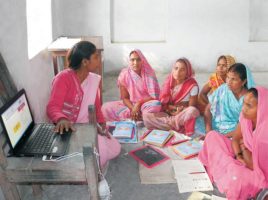Strategies to Deal with COVID Pandemic
 Indian economy has been cruelly impacted due to the COVID 19 pandemic and is still struggling to come on track. As per the Government of India forecast in the financial year 20-21, GDP growth has decreased from 5.3% in February 2020. With an unemployment rate of 27.11% till the month of May 2020, the country faced a lot of challenges especially in urban areas where about 93 million people got affected by the health crisis.
Indian economy has been cruelly impacted due to the COVID 19 pandemic and is still struggling to come on track. As per the Government of India forecast in the financial year 20-21, GDP growth has decreased from 5.3% in February 2020. With an unemployment rate of 27.11% till the month of May 2020, the country faced a lot of challenges especially in urban areas where about 93 million people got affected by the health crisis.
The government has launched ‘Aatmanirbhar Bharat Abhiyaan’ for building a self-reliant Indian economy in the long term through a comprehensive package of Rs 20 lakh crore equivalent to 10% of the GDP of the country. The need of hour is a planned monitoring and evaluation of implementation; development of methods to measure the economic, social and environmental outcomes of the measures taken in the short, medium and long term.
One of the most affected sectors is the skill development ecosystem. Development Alternatives (DA) Group as an organisation has come up with the following two-fold working strategy to combat this issue:
- Skilling of stakeholders for conducting and monitoring the digital training.
- Reaching out to other organisations and joining hands for solving these issues.
Skilling ecosystem is at the “brink of change” and with this there can certainly be a dawn of more techno-centric education and training in the entire country if the government, civil society organisations and communities can come together to adopt and understand digitalisation as a new way of learning. DA has put several efforts in the form of different initiatives to provide knowledge, relief and support to target groups such as youth and women, vulnerable communities and frontline health care workers. E-Learning platforms have been initiated – WhatsApp groups, website based training and zoom call training.
Formal education system has also been affected. By developing and digitising learning materials to conduct online sessions, an alternative approach to formal education was adopted and tried with a group of young school girls. This gave learnings on how this issue needs to be seen from a more comprehensive lens which should be sensitive to basic problems of the students, even those belonging to the remote areas of the country.
This pandemic has seen 3 women led federations in Bundelkhand, one of the poorest regions in India, actively provide micro credit services to the rural community for their livelihood purposes. These federations have become the first choice to fulfil the financial need of the community during the lockdown due to their reliability and low interest rates. A national level association to support community based microfinance is needed to advocate for the sustainability of the federation system and support rural entrepreneurship to ultimately overcome the economic crunch due to any disastrous situation in the future.
Sandeep Khanwalkar
skhanwalkar@devalt.org
The views expressed in the article are those of the author’s and not necessarily those of Development Alternatives.
This blog first appeared as an editorial in Development Alternatives Newsletter July, 2020





Leave a Reply